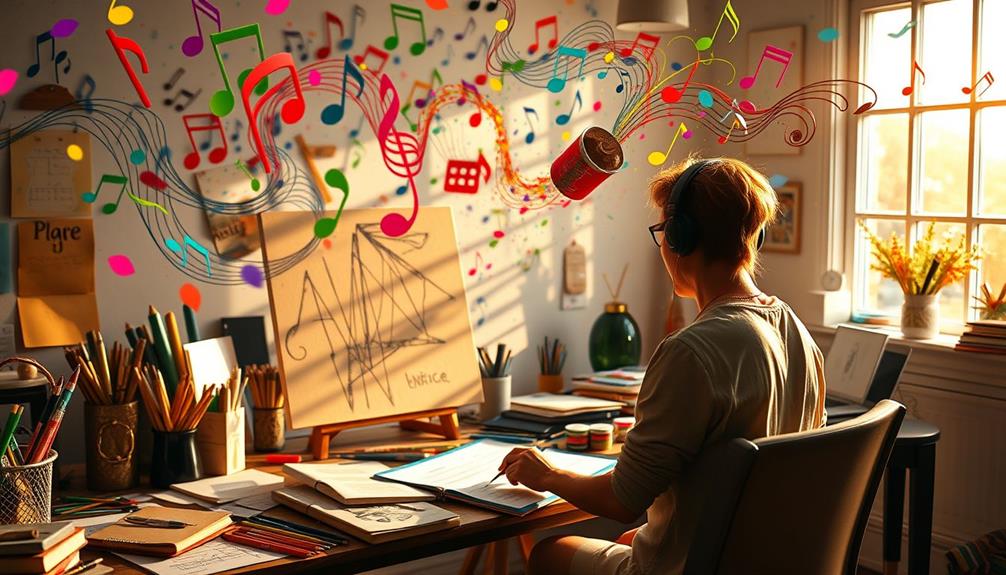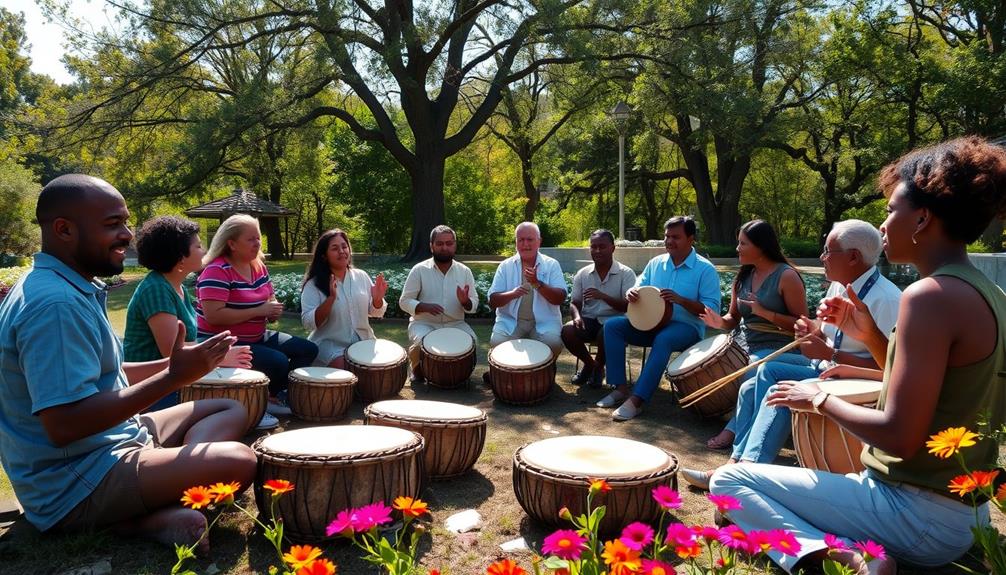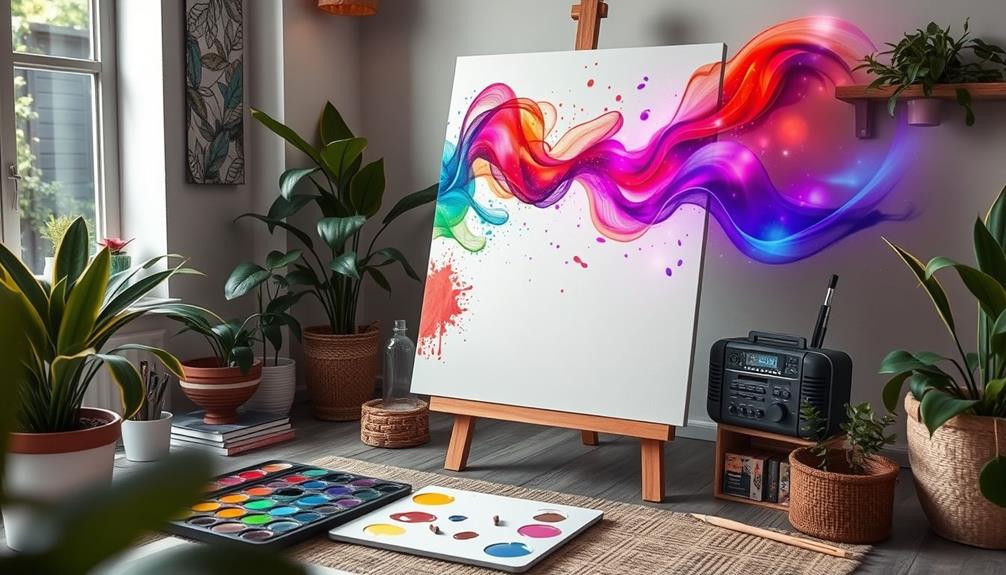To boost your creativity with music, start by curating playlists that match your tasks. Upbeat tunes energize brainstorming sessions, while calming instrumental tracks can enhance focus during research. Aim for music with a tempo of 60-80 BPM; this rhythm syncs with your heartbeat, promoting relaxation and idea generation. Familiar songs evoke nostalgia, helping you overcome creative blocks. Don't forget to experiment with various genres and themes to discover what fuels your spark. Engaging with local music communities can further inspire innovative ideas. There's much more to explore about the powerful connection between music and creativity.
Key Takeaways
- Curate upbeat and instrumental playlists to enhance cognitive flexibility and maintain focus during creative tasks.
- Engage with music that has a tempo of 60-80 BPM to synchronize with your heartbeat and foster idea generation.
- Utilize familiar songs to trigger positive memories, helping to overcome creative blocks and boost mood.
- Match music styles to different creative phases: upbeat tracks for brainstorming and calming tunes for research.
- Participate in community music events to explore diverse musical styles and stimulate collaboration and new ideas.
Understanding Creativity
Creativity is like a muscle that you can strengthen with the right practice and environment. It involves two key thinking processes: divergent thinking, which helps you generate original ideas, and convergent thinking, where you narrow down those ideas to find feasible solutions.
You can cultivate this crucial skill through consistent practice and by surrounding yourself with stimulating experiences. Exploring AI in music creation can provide innovative tools that enhance your creative process, as technology reshapes traditional music creation methods.
Emotional states play an important role in your creativity. Research shows that positive emotions, especially those stirred by happy music, broaden your mindset and enhance cognitive flexibility.
When you listen to upbeat tunes, you not only feel good but also open your mind to new possibilities. Happy music can greatly boost your creativity by increasing divergent thinking scores, leading to more innovative ideas compared to silence or other types of music.
Engaging in creative problem-solving is essential across various fields. By tapping into your creativity, you can tackle complex social issues or innovate in your workplace.
Music's Cognitive Impact

Music's emotional engagement can transform your creative process, sparking new ideas and connections.
Different types of music, especially upbeat or instrumental tracks, can enhance cognitive flexibility and focus.
Additionally, essential tools for creating enchanting music tracks can also influence your creative output.
Emotional Engagement Benefits
When you immerse yourself in emotionally engaging music, particularly tracks that are upbeat and cheerful, you're likely to experience a boost in your creative thinking. Studies show that music helps enhance divergent thinking, which is essential for generating original ideas. Happy music creates an environment conducive to creativity, allowing you to explore problems from multiple perspectives with greater cognitive flexibility.
Here's a quick overview of how emotional engagement with music impacts your creative process:
| Emotional Engagement | Benefits |
|---|---|
| Upbeat and Cheerful Music | Boosts divergent thinking scores |
| Familiar Songs | Triggers memories, overcoming blocks |
| Positive Emotional States | Broadens mindset for exploration |
| Emotionally Impactful Music | Enhances problem-solving abilities |
Types of Music
Certain types of music can dramatically influence your cognitive processes, acting as a catalyst for creativity. Research indicates that happy music considerably boosts divergent thinking scores, helping creative minds generate more ideas and innovative solutions compared to silence.
If you want to enhance your brainstorming sessions, consider incorporating high-energy and upbeat playlists like "Creative Boost" or "Wake up Happy." Additionally, yoga practices that involve breathing exercises can further enhance focus, allowing for a more productive creative environment.
Additionally, music with a tempo of 60-80 beats per minute can synchronize with your heartbeat, creating a prime listening experience that enhances creativity. Instrumental music is also highly recommended, as it stimulates both left and right brain activity while preventing distractions from lyrical content.
Studies have shown that emotional engagement with music can further increase the number of ideas you generate during creative tasks. By tapping into the power of these various types of music, you can create an environment that fosters creativity and productivity.
Music in Professional Settings
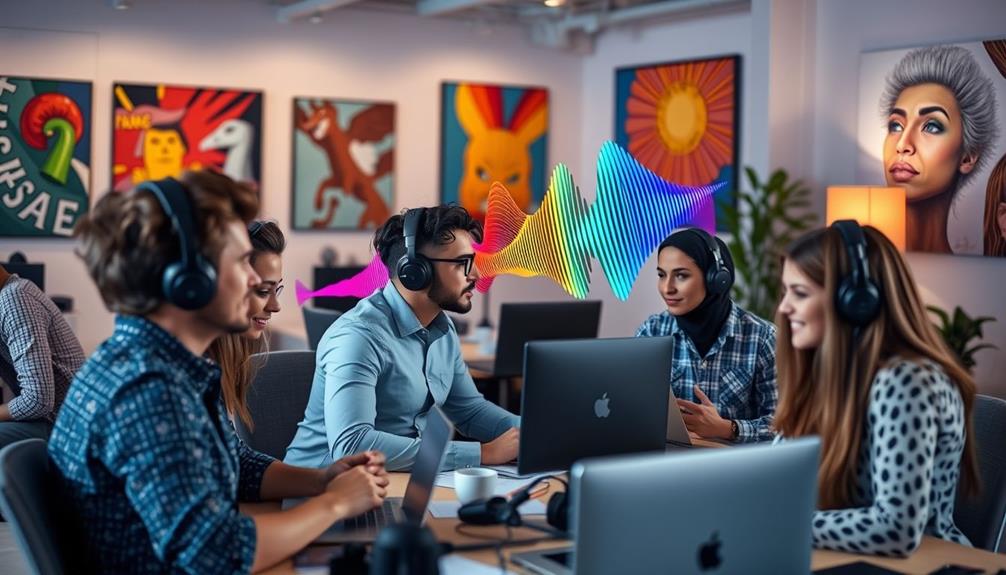
In professional settings, the right music genres can sharpen your focus and enhance your productivity.
Research shows that AI advancements raise significant privacy concerns when considering the impact of soundscapes on our cognitive processes.
By strategically choosing playlists for brainstorming sessions, you can create an environment that sparks creativity and collaboration.
Plus, understanding the emotional impact of music on your mindset can further elevate your creative output.
Music Genres for Focus
Music can be a powerful tool for enhancing focus in professional settings, and choosing the right genre can make all the difference. Upbeat playlists, like "Epic Workout" and "Rock to Work," can energize your environment, helping you stay engaged during tasks such as client proposals and design briefs.
When you're seeking to maintain concentration, instrumental music is your best bet. It stimulates both hemispheres of your brain without the distraction of lyrics, allowing for deeper focus. Additionally, incorporating natural elements in your workspace, akin to the cottagecore design philosophy, can further enhance your productivity and creativity.
During extensive research phases, enjoyable and upbeat music can sustain your energy levels, keeping your mind productive. For tasks that require a creative touch, such as sketching or design execution, motivating and genre-specific music can boost your confidence and enhance your understanding of the cultural context you're working with.
If you need to engage in cognitive tasks, consider playlists designed for creativity, like "Productive Morning" and "Brain Food." These can facilitate free-flowing ideas and help you stay focused on your goals.
Playlist Strategies for Brainstorming
Kickstart your brainstorming sessions by curating the right playlists that spark creativity and collaboration. Upbeat playlists like "Epic Workout" or "Rock to Work" can energize the atmosphere, encouraging everyone to share ideas freely.
Consider enhancing your environment with a touch of coffee culture, as unique mushroom coffee pods can provide health benefits that keep energy levels high. However, when you're deep in brainstorming mode, consider shifting to instrumental music. This type of music stimulates creativity without the distraction of lyrics, allowing for full cognitive engagement.
Research shows that listening to happy music can greatly enhance divergent thinking, leading to more innovative ideas. Tailoring your playlists to match the brainstorming phase is vital; for initial idea generation, "Productive Morning" tunes can set the right tone, while "Brain Food" playlists are perfect for deeper thinking sessions.
Additionally, incorporating music with a tempo of 60-80 beats per minute helps synchronize thinking patterns, promoting a relaxed yet focused state.
Emotional Impact on Creativity
Curating the right playlists isn't just about setting the mood; it's also about harnessing the emotional power of music to enhance creativity in professional settings. Happy music can markedly boost divergent thinking scores, leading you to generate more ideas and innovative solutions.
When you emotionally engage with music, it enhances your cognitive flexibility, allowing you to approach problems from various perspectives—essential for creative problem-solving. Incorporating insights from healthy lifestyle blogs can also provide inspiration on how to maintain an engaging and productive work environment.
Instrumental music serves as an excellent choice, as it stimulates both left and right brain activity without the distraction of lyrics. This balance is particularly effective during brainstorming sessions, where you need to let your creativity flow freely. Additionally, the positive emotions elicited by uplifting music broaden your mindset, encouraging exploration and enhancing overall creativity in your tasks.
To truly optimize productivity and innovation, tailor your music selections to fit different creative phases. Consider upbeat playlists for brainstorming sessions, while reserving calming music for focused research.
Curating Your Playlists
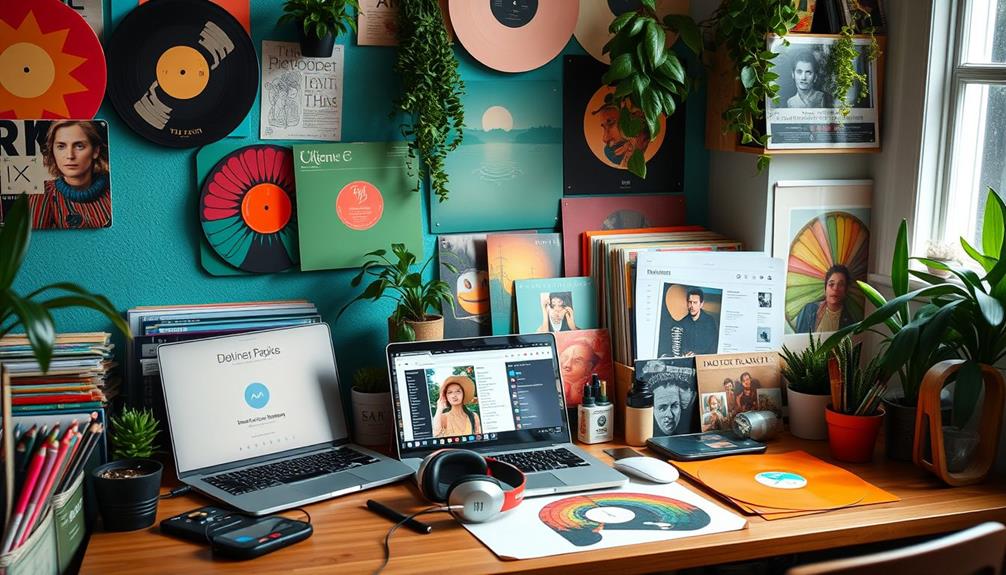
A well-crafted playlist can be a game-changer for your creative sessions. When curating playlists, think about incorporating high-energy tracks that evoke positive memories; they can boost your mood and stimulate creativity.
Consider blending instrumental music without lyrics into your selections. This helps you stay focused, as it activates both hemispheres of your brain without causing distractions. Additionally, drawing inspiration from the meticulous process of perfecting espresso extraction can serve as a reminder to balance energy and calmness in your musical choices.
Try creating themed playlists for different creative phases. Upbeat tracks can energize your brainstorming sessions, while calming tunes are perfect for research. Research suggests that songs with a tempo of 60-80 beats per minute sync with your heartbeat, enhancing your listening experience and fostering an environment ripe for idea generation.
Don't hesitate to experiment with various music genres in your playlists. This exploration can lead to unexpected insights and innovative connections, ultimately enhancing your creative output.
Emotional Influence of Music

Music can profoundly influence your emotions, shaping your creative process in unexpected ways. When you engage with uplifting tunes, you're likely to experience positive emotions that can greatly boost your creativity. Happy music has been shown to enhance divergent thinking, allowing you to generate more innovative ideas compared to silence.
Here's a glimpse into how different emotional responses to music can impact your creativity:
| Type of Music | Emotional Impact |
|---|---|
| Uplifting Pop | Increases positive emotions |
| Familiar Classics | Triggers nostalgic feelings |
| Instrumental Jazz | Enhances cognitive flexibility |
| Calming Classical | Reduces stress, promoting focus |
Emotional engagement with music broadens your mindset, encouraging exploration and creative output. When you listen to familiar songs that evoke positive memories, it helps you overcome creative blocks by recalling feelings tied to past successes. While convergent thinking remains unaffected by music, the emotional states created by happy tunes foster an environment ripe for creativity. Embrace the emotional influence of music, and let it guide your creative journey.
Engaging With the Community
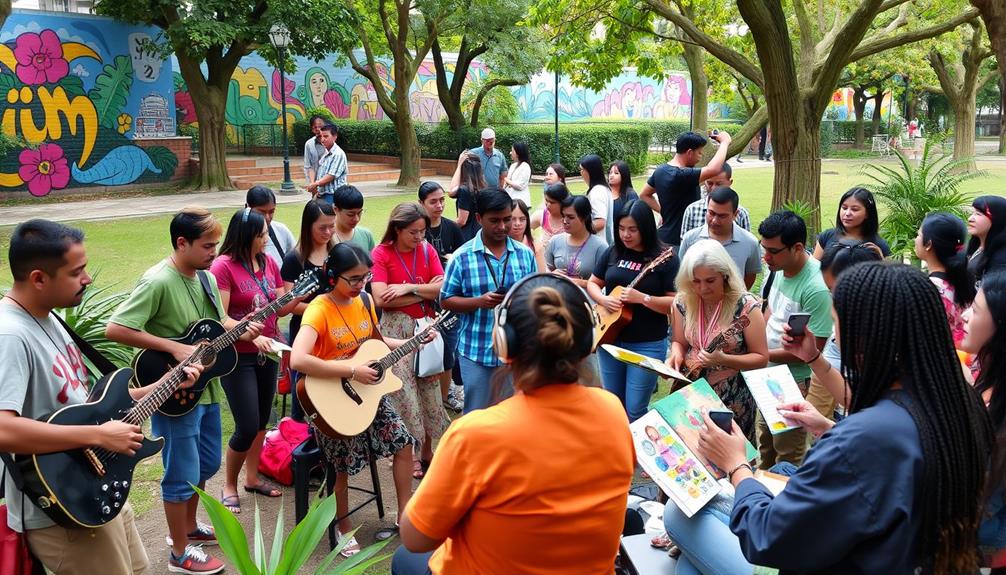
Engagement with a vibrant community of creatives can spark fresh ideas and collaboration. When you immerse yourself in a community of fellow artists, you open the door to collaborative projects that can lead to innovative solutions.
By participating in local music events or workshops, you get the chance to explore diverse musical styles, enhancing your creative thinking and broadening your perspectives. Additionally, organizing group activities, like crazy games, can break the ice and foster a playful environment that stimulates creativity.
Online forums and social media groups dedicated to music and creativity serve as excellent platforms for exchanging playlists and personal experiences. This fosters a supportive environment that encourages artistic growth.
Joining community orchestras or bands not only sharpens your musical skills but also helps you build relationships that inspire collective creativity. These connections can stimulate new artistic endeavors that you mightn't have explored alone.
Moreover, collaborating with artists from different disciplines, such as visual arts or dance, can lead to interdisciplinary projects that enrich your creative process. This cross-pollination of ideas often results in unique artistic expressions, pushing your creative boundaries.
Frequently Asked Questions
How Can Music Increase Creativity?
Music increases creativity by enhancing mood and stimulating both brain hemispheres. Upbeat tracks or instrumental tunes can help you focus, generate more ideas, and improve problem-solving, ultimately leading to a more productive creative experience.
What Music Triggers Creativity?
Music that sparks creativity often features fast, feel-good tunes or rhythmic instrumentals. You'll find high-pitched songs with steady beats energize your mind, while personal favorites evoke joy, enhancing your innovative thinking and inspiration.
What Music Makes You the Most Creative?
You'll find that happy music often makes you the most creative. Try instrumental tracks with a moderate tempo, and don't hesitate to mix genres. Your personal favorites can spark inspiration and elevate your mood, too.
How Does Music Support Creative Development?
Music supports your creative development by stimulating brain activity, enhancing divergent thinking, and elevating your mood. Engaging with happy tunes or instrumental tracks helps you generate original ideas and connect thoughts in innovative ways.
Conclusion
In the grand symphony of creativity, let music be your gentle maestro, guiding your thoughts and ideas to dance freely. As you explore the harmonious blend of tunes and tasks, you'll discover that each note can reveal hidden corners of your imagination. So, embrace the rhythm, curate your playlists, and let the melodies elevate your passions. With every beat, you're not just listening; you're inviting inspiration to waltz into your creative process.

